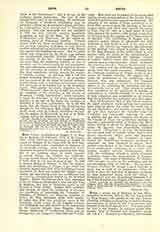

Brusa, a titular see of Bithynia in Asia Minor. According to Strabo, XII, iv, the city was founded by King Prusias, who carried on war with Croesus; according to Stephanus Byzantius, by another Prusias, contemporary of Cyrus, so that it would have been founded in the sixth century B.C. It is more probable that it was founded by, and was named after. Prusias, King of Bithynia and Hannibal’s friend, 237-192 B.C. Situated in a beautiful, well-watered, fertile plain at the foot of Mount Olympus, it became one of the chief cities of Roman Bithynia and received at an early date the Christian teaching. At least three of its bishops, Sts. Alexander, Patritius, and Timothy, suffered martyrdom during the persecutions (Lequien, I, 615-620, numbers only twenty-two bishops to 1721, but this list might be increased easily). The see was first subject to Nicomedia, metropolis of Bithynia Prima; later, as early at least as the thirteenth century, it became an exempt archbishopric. In the neighboring country and at the foot of Mount Olympus stood many monasteries; from the eighth to the fourteenth century it shared with Mount Athos the honor of being a principal center of Greek monachism. In 1327 it was taken by Sultan Orkhan after a siege of ten years and remained the capital of the Ottoman Empire till 1453. Brusa is today the chief town of the Vilayet of Khodavendighiar. It is celebrated for its numerous and beautiful mosques and tombs of the Sultans. Its mineral and thermal waters are still renowned. The silk-worm is cultivated throughout the neighboring territory; there are in the town more than fifty silk-mills. Brusa has about 80,000 inhabitants, of whom 6000 are Greeks, 9000 Gregorian Armenians, 2500 Jews, 800 Catholic Armenians, 200 Latins, and a few Protestants. The Assumptionists conduct the Latin parish and a college. The Sisters of Charity have a hospital, an orphans’ institute, and a school. Brusa is still a metropolis for the Greeks. It is also a bishopric for Gregorian and Catholic Armenians; the latter number about 4000.
S. VAILHE

